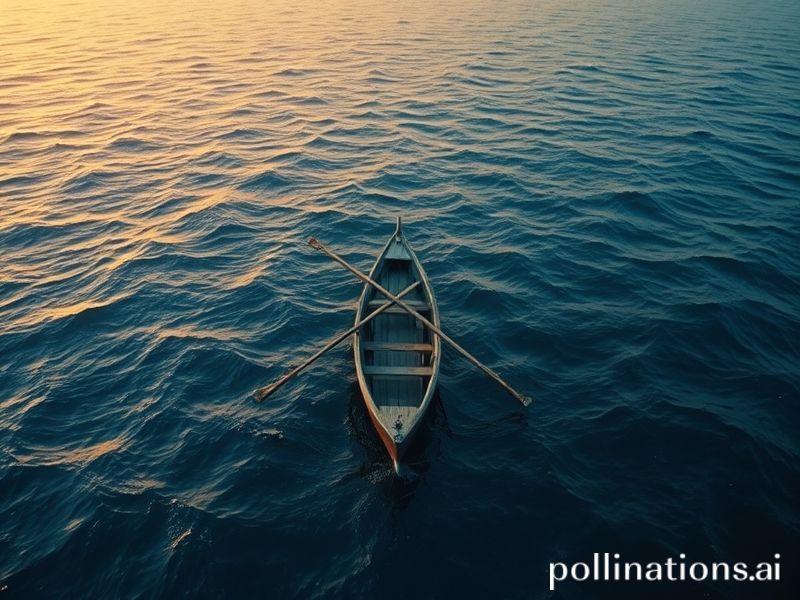The Atlantic in 2024: Where Empires Go to Become Driftwood
The Atlantic: Where Water, War, and Wi-Fi Collide
For centuries the Atlantic was the world’s original superhighway, a liquid autobahn for conquistadors, rum-runners, and cruise-ship retirees who dress formally for dinner and casually for colonialism. Today the ocean that once ferried smallpox and Shakespeare continues to ferry data, debt, and disinformation—only now the ships have fiber-optic arteries and the pirates prefer phishing rods to cutlasses.
Stand on the cliffs of Sagres at twilight and you can almost hear the ocean rehearse its greatest hits: the creak of caravels, the cough of diesel engines, the muffled ping of a submarine cable as a Russian trawler “accidentally” drags anchor across it. Portugal’s southwestern edge was once the launchpad for the Age of Discovery; now it hosts NATO radar dishes that look like giant golf balls searching for bogeys in the troposphere. Progress, it seems, is just exploration with better branding.
The Atlantic’s modern drama plays out in three acts, all running concurrently because nobody has the patience for linear storytelling anymore.
Act I: The Cold Reheat
NATO planners call it the GIUK Gap—Greenland-Iceland-UK—a choke point that sounds like a bad Icelandic boy band but is actually the maritime jugular between North America and Europe. Russian submarines have been popping up like unwanted LinkedIn requests, testing hydrophones and patience. Meanwhile, the United States parks destroyers in Rota as casually as Spaniards park scooters on sidewalks. Everyone insists the maneuvers are “routine,” a word diplomats use when they mean “ominous but boring.”
Act II: The Cable Guy
Beneath the waves, 400-odd submarine cables carry 95 percent of intercontinental internet traffic—TikTok dances, Ukrainian drone feeds, your aunt’s crypto evangelism. The cables are thinner than garden hoses, about as well guarded, and increasingly viewed as the soft underbelly of Western civilization. When the cable between Svalbard and mainland Norway was mysteriously severed last year, conspiracy theorists blamed everything from orcas with wire cutters to bored belugas. The official report cited “fishing equipment.” Translation: someone, somewhere, was trawling for more than cod.
Act III: The Weather Report
The Atlantic is also the planet’s mood ring. Its currents ferry not only heat but geopolitical anxiety: when the Gulf Stream slows, Europe shivers and starts eyeing North African solar farms with the same avarice once reserved for Indian spices. Hurricanes born off Cabo Verde now achieve Category 5 faster than a Tesla in Ludicrous Mode, flinging yachts into swimming pools and insurance adjusters into existential crisis. Climate change has turned the ocean into a cosmic loan shark: it remembers every carbon molecule and collects in compound interest.
And yet, for all the saber-rattling and sea-level-rising, the Atlantic remains humanity’s most crowded bathtub. Every summer, 30 million cruise passengers float atop it in vessels the size of small cities, burning heavy fuel oil and all-you-can-eat shrimp in equal measure. They Instagram sunsets while the crew, hailing from Manila to Minsk, serve piña coladas and ponder the irony of being stateless on the very sea that once drew national borders in blood.
At night, container ships the length of four football fields glide eastward loaded with American liquefied natural gas—freedom molecules, as the marketers insist—destined to keep German homes toasty and Russian pipelines obsolete. The irony is not lost on anyone except the marketing department.
Soon, floating wind farms will sprout like metallic kelp, powering data centers that train AI to predict the next hurricane while simultaneously causing one more cable cut. The circle of life, venture-capital edition.
So what does the Atlantic signify in 2024? A moat, a motorway, and a mirror. It divides and connects, drowns and ferries, reminds us that every empire eventually becomes driftwood. The same water that swallowed the Titanic now laps at the edge of SpaceX launchpads. We stand on its shores, phones in hand, waiting for a signal from the other side—unaware that the signal is already here, carried not by wind or sail but by the silent pulse of light beneath the waves. The Atlantic, ever the pragmatist, keeps working while we argue over who owns it.







